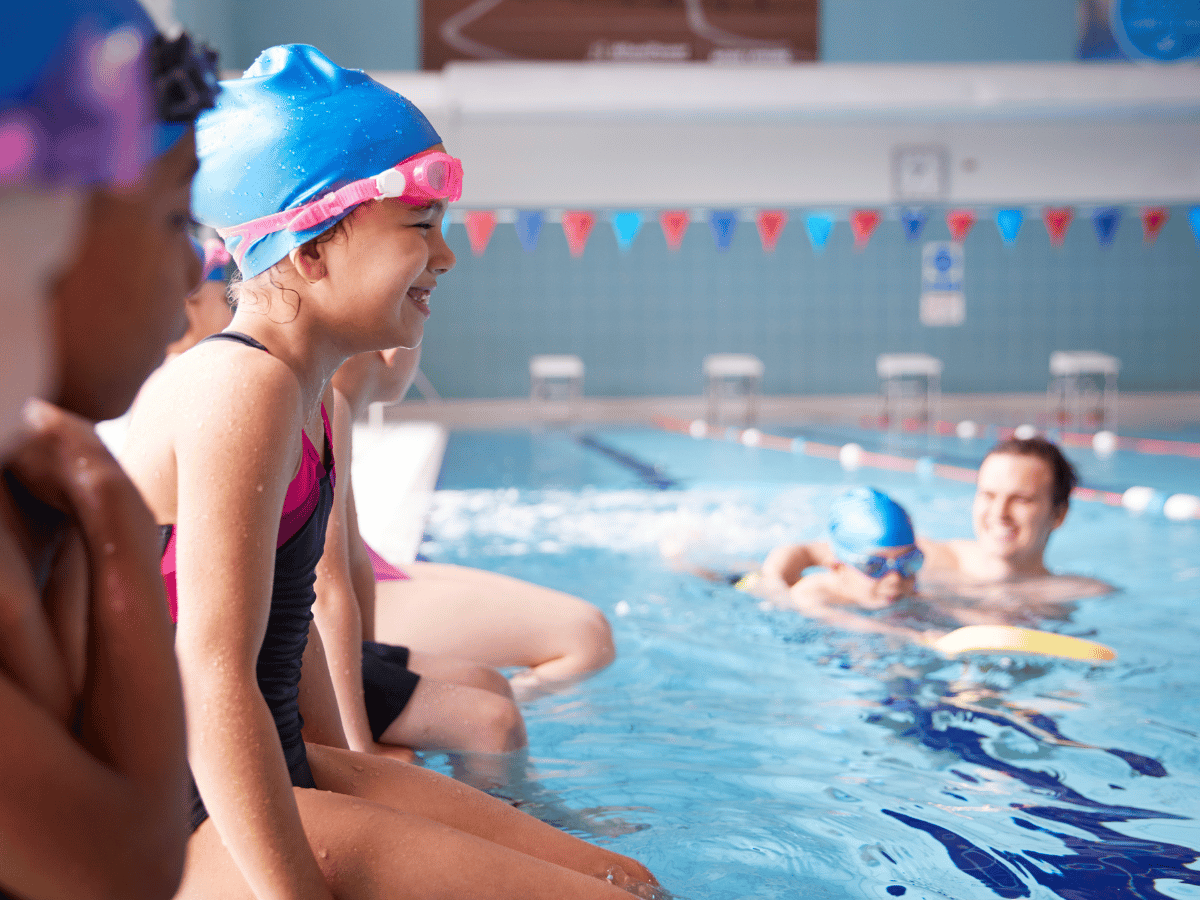Whether you’re at the beach or in the pool, nothing beats the joy of splashing around in the water. Not only is swimming fun, but it brings many benefits for your child including regular exercise, cultivating social skills, overcoming the fear of water, and building a new skill.
Enrolling your child in a swim school can help your little one build the skills needed to join you on memorable water adventures with full confidence. Here are a few additional reasons why you should enroll your child in swim school and at what age it may be beneficial.
Why should your child learn to swim?
There are a few big benefits of learning how to swim. When you enroll your child at a young age in swim lessons, they will achieve these benefits early.
The Skill of Swimming = Safety
Swim lessons allow children to stay safe in and around water. Aside from teaching children life-saving swim skills, these lessons also guide them on essential safety elements such as the role of a lifeguard and pool deck safety. Once deep-rooted into your child’s mental and muscle memory, these skills ensure every swimming adventure they take throughout their lives is a safe and fun one! Not to mention, as a parent, a confident swimmer gives you more peace of mind.
Build Confidence and Perseverance
Learning a new skill takes time. When your child is introduced to the art of swimming, they can experience setbacks and progress. Enrolling them in a swim school allows them to learn from both their instructor and peers. This learning journey encourages them to keep trying until they finally get the hang of it. The end result? Your child doesn’t just end up being a confident swimmer, they learn the vital skill of perseverance.
No More Fear of Water
Learning how to swim can be daunting at any age. It isn’t easy to train yourself to fully submerge your body in water, hold your breath, and get used to navigating the pool or other bodies of water. When you enroll your child in swim class, they will learn to get used to all the new sensations at their own pace. Once comfortable in water, mastering new swimming skills can be a fun adventure.
Swimming is an Awesome Exercise
Swimming is a great exercise for children of all ages. This low-impact sport boosts cardiovascular health, improves muscle strength, and even burns calories. When your child learns to swim, they also learn to strengthen their legs, back, core, lungs, and overall body!
Improves Social Skills
When enrolling your child in swim lessons, specifically at a swim school, they will get the chance to learn alongside other students. Learning together is a great way to help your little one make new friends and socialize.
Why choose a swim school over private lessons?
Most sports are learned best in a group setting. There are a few reasons why:
- Swim schools create a social environment where your child gets to learn amidst peers. This setting creates a feeling of support and community, allowing your child to learn from both instruction and observation.
- Swim schools promote goal-oriented learning. Learning with others unlocks friendly competition which keeps your child engaged. Children also develop learning etiquette by waiting for their turn during a session.
- Consistent group feedback enables your child to receive repeated information about every element of the practice.
- Swim schools are more affordable than private lessons, making it a budget-friendly option for parents to get their kids to become skilled swimmers.
When should you enroll your child in swim school?
The main things to ask yourself when considering enrolling your child in swim school are questions regarding their:
- Emotional maturity
- Comfort level in the water
- Physical and development abilities and limitations
When considering your child’s age, there is research proving that swim lessons in children ages one through four reduce the risk of drowning by 88 percent. Infants under 1 may show basic swimming reflexes, but they’re not yet capable of keeping their heads above water on their own. Enrolling in a parent-child water play program is a good way to help your infant get used to the pool before starting lessons.
Most parents begin enrolling their children in swim lessons around 4 years old. This is often the perfect age to develop water survival skills like floating, reaching an exit point, and treading water. Ages 5-6 are often when children become fully capable of mastering the front crawl or freestyle.
What should you look for when choosing a swim school?
Before deciding on a swim school for your child, here are a few things you should look for:
- A Well-Rounded Curriculum: How comprehensive is the course? Does it include lessons focused on skills such as injury prevention, balance, water safety, speed training, and strength training?
- Trained and Certified Instructors: Are the instructors teaching your children fully trained and certified? Base qualifications to look for include CPR and AED certifications. Are they qualified to teach toddlers? How frequently do they evaluate their student’s progress? Do they offer consistent feedback on their student’s skill levels?
- Skill Levels and Age Groups: Swim schools generally offer swim lessons based on age groups and skill levels. Make sure you find a program that aligns with your child’s learning journey.
- Safety Habits and Water Survival Skills: Does the program teach children what to do if they end up in the water unexpectedly? Are the students encouraged to follow safety best practices such as not entering the pool without adult supervision, and pool deck safety?
If your child is under four years old, there are some additional things that you should keep an eye out for. This includes:
- An age-appropriate program
- Appropriate water purity, disinfection processes and chlorine levels
- A warm pool (temperatures no less than 87-96 degrees Fahrenheit)
Enrolling your child in a swim school can be the start of a wonderful journey. Whether your child learns to like the water just enough to where they are safe in and around bodies of water or if they learn to love the water and pursue further swimming activities – by starting them young, you will set them up with lifelong skills.






